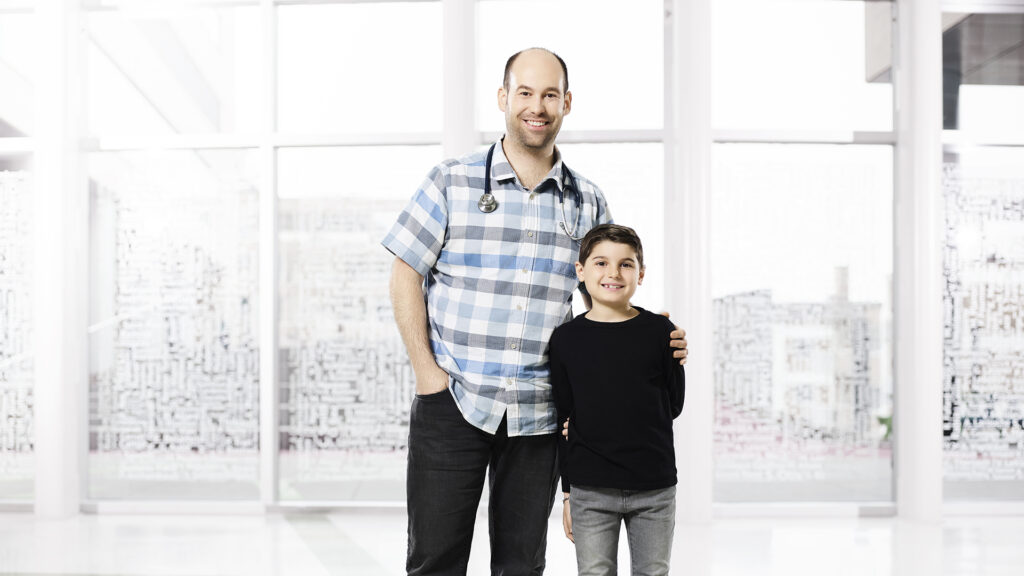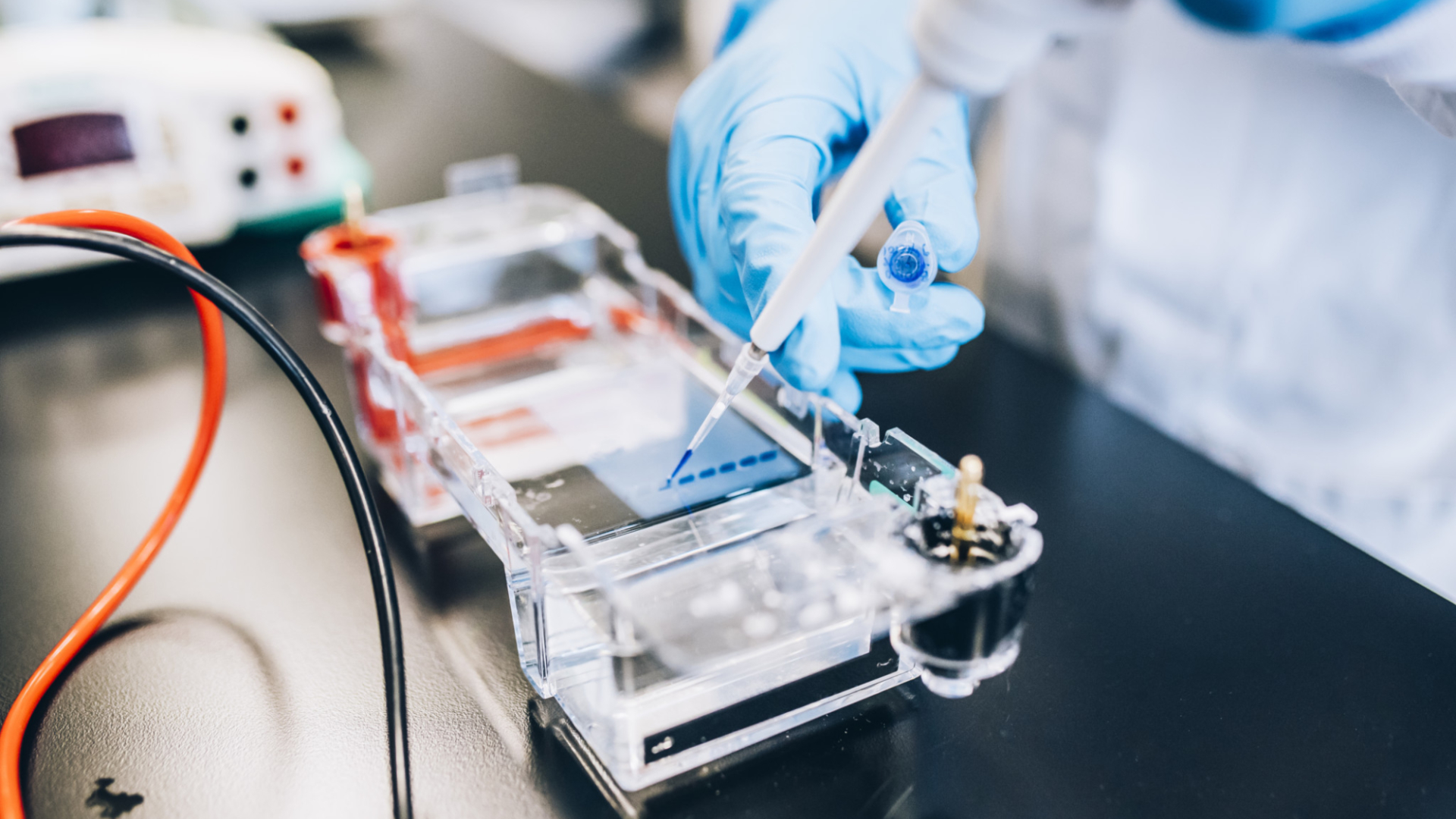Research projects are vital in the fight against COVID-19. We currently know very little about the coronavirus, hence the pressing need to determine how it acts and how we can minimize its spread, find effective treatments for various groups and, eventually, prevent it altogether.
Sainte-Justine is the designated facility for the testing and hospitalization of children with COVID-19 in Quebec as well as a respected authority in infectious diseases and a leader in precision medicine. As such, CHU Sainte-Justine has identified a number of research projects that show the most promise in facing the current crisis and keeping outbreaks from escalating in the future. And it needs you to help them come to life.
Treating COVID-19 patients through an antibody sharing program using convalescent plasma
What if we could use the plasma of people who have recovered from COVID-19 to transfer the antibodies necessary to fight the virus to patients who currently have the disease? This type of plasma is referred to as “convalescent plasma.” It has been used in the past for other epidemics and pandemics, including influenza, SARS and Ebola. A number of studies have reported a significant reduction – up to 75% – in mortality risk. When administered at the onset of first symptoms, the treatment may therefore prevent the progression of the disease in diagnosed patients.
Amidst the current crisis, this immunization program has been used in China and Italy and is being rolled out in New York. Under the leadership of Dr. Philippe Bégin, a clinician-scientist at Sainte-Justine, the entire scientific community in Quebec is now mobilized to support this approach within the province. Dr. Bégin has initiated collaborations with over a dozen hospitals in Quebec to take part in a clinical trial to validate the merits of this approach. Once its efficacy has been confirmed, it will be deployed for general clinical use.
There is widespread consensus in the research community as to the usefulness and relevance of this therapeutic option in a pandemic scenario. In the current crisis, it is even more important to put a program in place to lift these barriers as quickly as possible to make the treatment available to the public sooner rather than later. This is not a drug per se. The key lies in getting people in Quebec to share their antibodies, in a show of solidarity and support for the community.
« Few studies tell us what type of antibody or how much plasma is needed in such cases. The best way to get a clearer picture is to gather as much data as possible as quickly as possible. In this race against time, the best way to move quickly is to have several people doing the same protocol to put all the data together. »

Producing a monoclonal antibody to avoid shortages of an efficacious drug
Since the beginning of the COVID-19 crisis, children seem to have responded differently to the virus. Only a small number get sick, and their mortality rates are very low. Some are even asymptomatic. There are several theories as to why adults and children do not have the same reaction, but so far there are no definitive answers.
By conducting a thorough examination of the immune response of children and adults aged 0 to 100, this multidisciplinary project, combining a clinical study and translational research, will help determine whether certain genetic or physiopathological factors favour the emergence of more severe forms of the disease.
Understanding these factors is crucial in setting up more effective prevention, treatment and therapeutic measures adapted to patients of all ages, in establishing a correlation between the progression and clinical severity of the virus, and in curbing the disease.
Gaining a better understanding of the mechanisms responsible for serious cases of COVID-19 to improve prevention and treatment
Since the beginning of the COVID-19 crisis, children seem to have responded differently to the virus. Only a small number get sick, and their mortality rates are very low. Some are even asymptomatic. There are several theories as to why adults and children do not have the same reaction, but so far there are no definitive answers.
By conducting a thorough examination of the immune response of children and adults from all ages, this multidisciplinary project, combining a clinical study and translational research, will help determine whether certain genetic or physiopathological factors favour the emergence of more severe forms of the disease.
Understanding these factors is crucial in setting up more effective prevention, treatment and therapeutic measures adapted to patients of all ages, in establishing a correlation between the progression and clinical severity of the virus, and in curbing the disease.
« Fighting COVID-19 is like building the plane while you’re flying it. »
Providing researchers with data and enabling them to develop preventive measures against COVID-19
Although COVID-19 is the most recent pandemic to strike the planet, chances are it will not be the last. Using epidemiological approaches and machine learning, researchers at Sainte-Justine will aim to develop the best preventive measures to face future crises.
By gathering data on patients, including their exposure to the virus and their demographic, bioclinical and genetic information, and measuring the COVID-19 infection through biological samples (serology) from individuals across the province, researchers hope to provide Canadian scientists with epidemiological information and representative samples of the population essential to their work on COVID-19.
Working with its experts in machine learning, the CHU Sainte-Justine Research Centre hopes to create a model that can predict the course of an epidemic and the impact of public health measures.
Examining emergencies in Quebec: Perspectives and experiences of caregivers in hospital emergency departments during the COVID-19 pandemic
During a pandemic like COVID-19, caregivers are constantly exposed to a virus at the same time as they are forced to cope with an influx of patients. The resulting stress and anxiety are tremendous. Although they are trained to deal with situations like these, the extreme conditions they are required to work under can have significant repercussions.
The purpose of this study is to gain insight into: (1) caregivers’ thoughts about the risk to themselves compared to their duty to care for their patients; (2) the impact of a pandemic on the caregiver-patient relationship in the emergency room and the experience of ER caregivers in the context of limited resources; (3) the impact on the relationships among the various institutions and levels of government on healthcare professionals and staff.
The secondary action-research objective of this project will encourage participants to identify potential solutions to the issues brought up during the study and to present them to their supervisors. As a result, some solutions will be implemented during the COVID-19 crisis, resulting in an immediate positive impact on their well-being.
The results will potentially shed light on emergency caregivers’ experiences during a pandemic and how they change over time – something that is thus far undocumented. This information will help guide hospitals with regard to the critical issues faced by first-line caregivers during a global health crisis so that concrete innovations can be developed to respond to it. The findings will also be useful in preparing and training caregivers for the unique role of providing emergency care during a pandemic.










